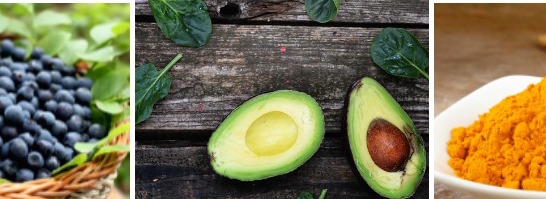
While acute, temporary inflammation is your body’s normal healing response to infection or injury (think of cutting your finger), chronic inflammation often happens when our bodies are overloaded with dietary and environmental toxins and our immune system is consistently in the “on” position.
We know that diet can be a huge factor in chronic inflammation. Inflammatory fire starters include the sugar you eat, high doses of the wrong oils and fats, hidden food allergens, and chemicals in processed foods. Other factors include lack of exercise, chronic stress, and infections.
Reducing inflammation should be a top priority for most of us – especially if your goals are to age healthily and stay lean. The good news is that what’s at the end of your fork can make a huge difference.
Here are my favorite tips to help you reduce inflammation – as well as my top 10 anti-inflammatory foods – so you can take care of your health and waistline.
Tips To Reduce Inflammation
Change your oils. Swap out highly refined oils such as vegetable, canola, soy, safflower and corn oil for olive oil (sautéing), extra virgin olive oil (low-heat cooking), and coconut oil, ghee or avocado oil (higher heat cooking).
Upgrade your fats. Load up on healthy anti-inflammatory fats like wild-caught fish, avocado, walnuts and chia and flax seeds. For meats, grass-fed and wild meats are much higher in anti-inflammatory fats than meats from factory farms that are grain-fed and plied with hormones and antibiotics. Downsize your use of margarine, fried foods and foods that contain partially hydrogenated oils, also called trans fats.
Limit sugar and foods that turn into sugar. Excess sugar and refined carbs (e.g., bagels, pasta, instant rice and others) spike insulin and increase inflammation. And they have no nutrititional value.
Go VegeCentric. Whether vegetarian or paleo, the majority of your food should be plant based. Plant foods flood your body with the vitamins, minerals, anti-inflammatory phytonutrients, antioxidants and fiber you need to recover from chronic inflammation. Go for dark greens, cruciferous veggies and colors of the rainbow.
Uncover and address your personal food sensitivities. If you are sensitive to a food, this will trigger an immune response, leading to inflammation. The most common sensitivities include dairy, gluten, soy, eggs and corn. If you need help figuring this out, give me a call.
Ensure your gut is happy and healthy. If your gut is damaged or inflamed then it’s not doing its job of keeping undigested food, bacteria and toxins from entering your bloodstream. This is called intestinal permeability, or “leaky gut.” If substances enter your bloodstream that shouldn’t be there, your immune system sends an inflammatory army to conquer the “aliens,” and inflammation can become systemic. To address this, fermented foods and/or probiotic supplements are often a good way to start. For a full plan, come see me.
Top Anti Inflammatory Foods to Include in Your Diet
Turmeric is the king of anti inflammatory spices. It has been shown to support brain health, liver function, immunity and digestion. Cook with it or take 1 tspn a day for maintenance. Curcumin is the ingredient behind its health benefits, and you can supplement with 400 mg 1-3 times per day.
Ginger. Widely used in Ayurvedic medicine, ginger also improves digestion. 2-4 grams of fresh ginger juice daily has been shown to help with pain.
Ginger and turmeric tea is a fantastic one-two anti-inflammatory punch!
Wild salmon. Salmon is full of omega 3s which offer inflammatory relief, as well as cognitive, mood and cardiovascular benefits. Eat twice a week for therapeutic effects. Trader Joe’s has a great fresh frozen option that is reasonably priced. OR take Omega 3 fish oil–– 1-2 grams — for similar benefits.
Tart cherries. Studies show that cherry juice can help arthritic pain and help athletes reduce taking pain meds post work-out. For medicinal benefits, 1 cup of tart cherry juice or 1.5 cups of frozen tart cherries (about 15-20).
Matcha is the only form of tea in which the whole leaf is consumed so it delivers a really healthy punch! Its plant nutrients are protective against many cancers and cardiovascular disease. Drink the tea or sprinkle the powder in smoothies.
Cacao is not only a highly potent source of antioxidants, but it also contains OEA, a fatty acid that combats inflammation just like omega 3s. Cacao is also high in magnesium and iron, and a serotonin booster. The more bitter the better — try raw cacao or dark chocolate over 72%.
Dark greens (kale, spinach collard greens and swiss chard) and colorful vegetables and fruits are dense with plant chemicals that fight inflammation and keep you healthy.
Berries rate really high in antioxidant capacity – and are low in sugar. Blueberries, cranberries and cherries have been shown to slow cognitive decline and improve memory.
Olive oil. The anti-inflammatory compounds in olive oil include at least nine different categories of antioxidants and more than two dozen other nutrients. Try 1-2 tablespoons of per day for therapeutic benefits.
Avocado is anti-inflammatory and great for heart health.
If you’d like a session to determine the best plan for you to lower inflammation, call me at 310-650-2825 or email me at mady@mwolfnutrition.com.

